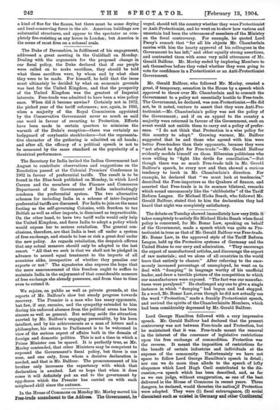Mr. Gerald Balfour, who followed Mr. Morley, created a great,
if temporary, sensation in the House by a speech which appeared to throw over Mr. Chamberlain and to commit the Government to a policy not essentially hostile to Free-trade. The Government, he declared, was non-Protectionist.—He did not, be it noted, venture to assert that they were Anti-Pro- tectionist.—Mr. Chamberlain's policy was not the policy of the Government ; and if on an appeal to the country a majority were returned in favour of the Government, such an event would not entitle them to carry out a policy of prefer- ence. "I do not think that Protection is a wise policy for this country to adopt." Growing warmer, Mr. Balfour suggested that he and those who agreed with him were better Free-traders than their opponents, because they were "not afraid to fight for Free-trade."—Mr. Gerald Balfour evidently models himself on those Hibernian politicians who were willing to "fight like devils for conciliation."—But though there was so much Free-trade talk in Mr. Gerald Balfour's speech, he every now and then showed a curious tendency to lurch in Mr. Chamberlain's direction. For example, he declared that "we must look at tendencies," described the Free-importers as the Quakers of finance, and asserted that Free-trade is in its essence bilateral, remarks which sound uncommonly like the "shibboleths" of the Tariff Reform League. Sir Michael Hicks Beach, who followed Mr. Gerald Balfour, stated that to him the declaration they had heard that night was completely satisfactory.






































 Previous page
Previous page